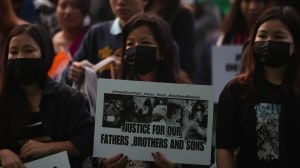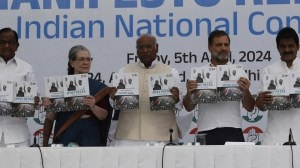- India
- International
In name of conversion, UP ‘love jihad’ law targets inter-faith unions
The Uttar Pradesh Prohibition of Unlawful Conversion of Religion Ordinance, 2020, promulgated last week, specifically prohibits any conversion for marriage, even if it is with the consent of the individual except when prior sanction is obtained from the state.
 The anti-conversion ordinance provides a jail term of up to 10 years for any violation of its provisions. (File)
The anti-conversion ordinance provides a jail term of up to 10 years for any violation of its provisions. (File)Shifting the burden of proof of a lawful religious conversion from the converted to his/her partner; defining “allurement” in sweeping terms; disregarding agency of the person converting; different jail terms depending on gender; legitimising the intrusion of the state and third parties in the choice of who an individual wishes to marry – the new Uttar Pradesh “love jihad law” raises several questions of Constitutional propriety.
The Uttar Pradesh Prohibition of Unlawful Conversion of Religion Ordinance, 2020, promulgated last week, in the name of seeking to end conversion through unlawful means, specifically prohibits any conversion for marriage, even if it is with the consent of the individual except when prior sanction is obtained from the state.
Section 3 of the Ordinance, being seen as a template by many BJP-ruled states, prohibits any unlawful conversion and conversion generally for marriage. Its Section 6 specifies that “any marriage that takes place for the sole purpose of unlawful conversion” or “vice-versa” will be “deemed null and void” by a family court unless a prior sanction to convert and marry is received from the district magistrate.
“There is no legal basis for prohibiting conversions, even solely for marriage,” said Jayna Kothari, senior advocate and co-founder of Centre for Law and Policy Research, a Bengaluru-based legal advocacy group. “By involving the state, the police and the family of the individuals seeking to marry, the law attempts to only stop all inter-faith marriages.”
Also Read | UP: Labourer booked under anti-conversion law
Apart from the person seeking to convert, even the individual presiding over the conversion is required to make an application under the law to the district magistrate. The magistrate, through the police, will then look into the “real intention”, “purpose” and “cause of the proposed religious conversion.”

Opinion: Liberty of inter-faith couples must be celebrated, not reviled
The UP law has a sweeping definition of what it calls “allurement” — one of the unlawful aspects of conversion. From the promise of “any gift”, “gratification” to “better lifestyle” and “divine displeasure or otherwise”, the term encapsulates any benefit expected from conversion.
While “any gift” could include even non-material gifts like a religious text, the promise of a better lifestyle are future events which may or may not happen but could still be used to declare a conversion unlawful.
If the magistrate is not satisfied, then criminal action under Section 11 of the ordinance can be initiated against persons who “caused” the conversion. This includes those who committed the offence, omitted to act and prevent the offence and those who aid, abet, counsel or procure people for committing the offence.
However, Section 12 of the law places the burden of proving that an individual lawfully converted on people who “caused” or “facilitated” the conversion and not on the individual. This means that even if a woman, who has converted from one religion to another, says that she had consented to the conversion, this will not be sufficient. The individual’s partner, who is deemed to have “caused” the conversion, will have to prove the real intention of the conversion.
This reverse burden of proof, legal experts say, undermines the agency of the individual converting from one religion to another by disregarding their consent. The law also allows parents, siblings, or any other person related to the individual converted — by blood or marriage — to question the legality of the conversion.
Also Read | UP law sees first case: Kin of 20-year-old move against Muslim friend
“Right to convert to another religion is a fundamental right. This law strikes at the heart of it,” said Ashwini Obulesh, women and child rights advocate and co-founder of Dhwani Legal Trust, a non-profit legal aid society.
The law does not apply to inter-faith marriages under the Special Marriage Act, where both individuals can retain their religious identities but applies solely to inter-faith marriages where either the husband or the wife seeks to convert to a different religion to marry under personal laws.
The Special Marriage Act, which also requires a one-month notice to the state stating intention to marry is deemed problematic to couples who seek to marry against wishes of the family or community at large. During the notice period, the magistrate invites objections to the proposed marriage, which could be challenging to couples.
Opinion: Long and deceitful history of the ‘love jihad’ bogey
Conversion and marriage through religious laws is one of the legal routes inter-faith couples often take to avoid this one-month notice to the state, even at the risk of losing their rights under personal law, like inheritance. The new law, however, bars such marriages and introduces more restrictions to be allowed to marry. “In the Special Marriage Act, public documentation of details of the prospective bride and groom and its display during the notice period is itself currently under challenge before the Supreme Court as it is detrimental to the safety of the couple. This law takes it one step further and requires the police to be satisfied of their intentions,” Obulesh said.
The offence under the ordinance is non-bailable and cognizable which means that an arrest can be made without a warrant. A minimum punishment of one year which can be extended up to five years is prescribed and repeat offences can carry double the maximum sentence. Men are awarded a higher punishment if convicted of causing conversion of a woman, minor or a person belonging to Scheduled Caste or Tribe, the minimum sentence is of two years which can extend up to 10 years.
Apr 25: Latest News
- 01
- 02
- 03
- 04
- 05








































